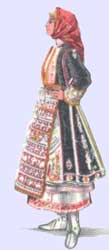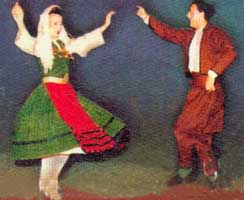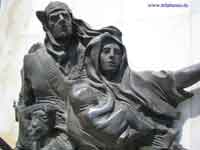|
|
Thrace is a historical and geographic area in south-east Europe spread over southern Bulgaria, north-eastern Greece, and European Turkey. Thrace borders on three seas: the Black Sea, the Aegean Sea and the Sea of Marmara. Classical Thrace and environs, from Alexander G. Findlay's Classical Atlas to Illustrate Ancient Geography, New York, 1849 History The indigenous population of Thrace was an Indo-European people called Thracians. Divided into separate tribes, the Thracians did not manage to form a lasting political organization until the Odrysian state was founded in the 4th century BC. The Thracians fell early under the cultural influence of the ancient Greeks, preserving, however, their language and culture. As non-Greek speakers, they were viewed by the Greeks as barbarians. The first Greek colonies in Thrace were founded in the 6th century BC. Thrace south of the Danube (except for the land of the Bessi) was ruled for nearly half a century by the Persians under Darius the Great who conducted an expedition into the region from 513 BC to 512 BC. The region was conquered by Alexander the Great in the 4th century BC and was ruled by the kingdom of Macedon for a century and a half. Following the Third Macedonian War, Thracia came to acknowledge Roman authority. The client state of Thracia comprised of several different tribes. In 279 BC, Celts advanced into Macedonia, Greece and Thrace. They were soon forced out of Macedonia and Greece but remained in Thrace until the end of the century. From Thrace, three Celtic tribes advanced into Anatolia and formed a new kingdom called Galatia. [1] (http://resourcesforhistory.com/map.htm) After Roimitalkes III of the Thracian Kingdom of Sapes was murdered in 46 AD, the Roman client state was abolished and the direct Roman rule began. The successor of the Roman Empire on the Balkans, the Byzantine Empire, retained control over Thrace until the beginning of the 9th century when most of the region was incorporated into Bulgaria. Byzantium regained Thrace in 972 only to lose it again to the Bulgarians at the end of the 12th century. Throughout the 13th and the first half of the 14th century, the region oscillated between Bulgaria and the Byzantine Empire. In 1352, the Ottoman Turks conducted their first incursion into the region subduing it completely within a matter of two decades and ruling over it for five centuries. In 1878 most of Thrace was incorporated into the semi-autonomous Ottoman provice of Eastern Rumelia, which united with Bulgaria in 1886. The rest of Thrace was divided between Bulgaria, Greece and Turkey at the beginning of the 20th century, following the Balkan Wars and World War I.
Sygkathistos, Thrace Cities of Thrace Bulgarian Plovdiv Greek
Turkish Edirne ("Adrianople") refounded by Hadrian, site of numerous battles, notably in 378 and 1205 Famous Thracians Orpheus, in Greek legend, was the chief representative of the art of song and playing the lyre, and of great importance in the religious history of Greece. Democritus was a philosopher and mathematician that lived in Abdera, Thrace from about 460 BC to 370 BC. His main contribution is the atomic theory, the belief that all matter is made up of various imperishable indivisible elements which he called atoms. Spartacus was a Thracian enslaved by the Romans, who led a large slave uprising in what is now Italy in 73 BC - 71 BC His army of escaped gladiators and slaves defeated several Roman legions in what is known as the Third Servile War. Maximinus Thrax, Roman emperor (235-238), born in Thrace to a Gothic father and an Alanic mother. Paeonius of Mende in Thrace, sculptor of the Nike in Olympia Sources Hoddinott, R.F., The Thracians, 1981.
 |
|||||||||||||||
|
|




